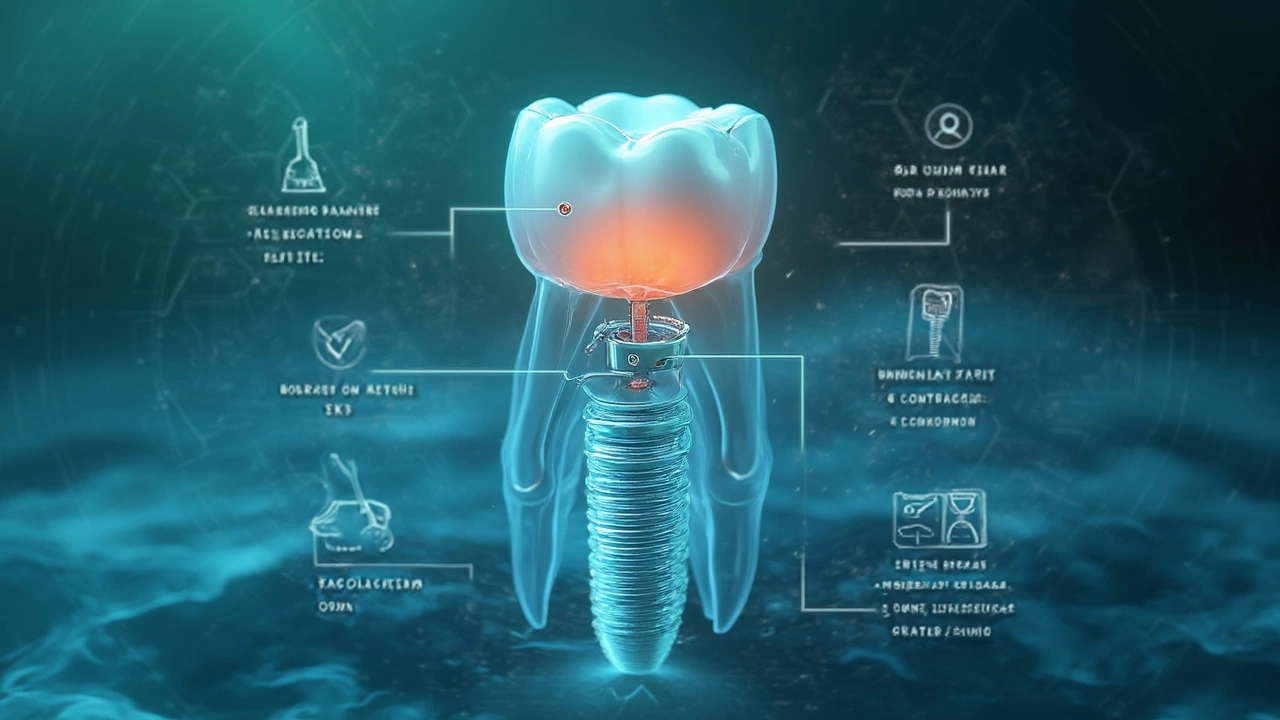Dental implants look and feel so much like real teeth, it’s easy to think they’re a perfect solution. But hang on—the downsides are real, and you deserve to know them before signing up for surgery.
First off: implants don’t always work out the way you hope. Around 5% of dental implants fail, and sometimes the signs show up months or even years later. The main culprits? Problems with how your jawbone heals, the way the implant was placed, or even how well you take care of your teeth after the surgery.
Here’s another thing people rarely mention—implants involve surgery, and that means there’s a risk of infections, bleeding, and swelling. Even a small infection can turn into a bigger deal if it reaches your bone. Most dentists will lay out strict aftercare instructions, but not everyone’s body reacts the same way.
- Not Always a Sure Thing: Implant Failure Risks
- Infections and Healing Problems
- Jawbone and Nerve Complications
- Cost and Long-Term Upkeep
- Who Should Think Twice?
Not Always a Sure Thing: Implant Failure Risks
You’d think dental implants would work for everyone, every time. But the truth is, they can and do fail, even when done by experienced dentists. It usually happens early—within the first few months—or much later down the line.
So, what causes things to go sideways? Sometimes your body just doesn’t accept the implant, and your jawbone can’t fuse with the metal post properly, a process called "osseointegration." If your bone quality isn’t strong enough, or if you’re a smoker, your odds of failure shoot up. Smokers are actually twice as likely to have issues with the implant not anchoring right.
Other times, it’s all about infection. If bacteria sneak in during or after surgery, your implant could start wobbling or even pop out. Overzealous cleaning routines, using your new tooth like a bottle opener, or skipping flossing can make things go south, too.
Don’t forget: certain medical conditions raise the risks even more. Folks with uncontrolled diabetes, osteoporosis, or immune system problems are more likely to see their implants fail, often without much warning.
Here’s what makes dental implants risky for some people:
- Smoking before or after surgery
- Poor bone quality or bone loss in your jaw
- Certain chronic diseases (like diabetes or autoimmune issues)
- Poor oral hygiene
- Biting hard objects or grinding your teeth
If an implant fails, you’re not just dealing with a loose tooth. You could face more surgery, extra costs, and quite a bit of frustration. The good news? You can stack the odds in your favor by following your dentist’s prep and recovery tips and being honest about your health and habits up front.
Infections and Healing Problems
Here’s the thing—getting a dental implant is basically a small surgery, and any surgery has a risk of infection. With implants, the most common type is called peri-implantitis. It’s a mouthful, but it just means that the gum and bone around the implant get infected, kind of like what happens with gum disease.
According to research, up to 10% of people with dental implants will have some kind of infection. Most infections crop up in the first year but can pop up later too. Swelling, pain, bad breath that doesn’t quit, or even pus around the gums—these are big red flags you can’t ignore.
Healing problems show up if your body doesn’t bounce back as expected. Smokers, people with diabetes, or those with weaker immune systems are more likely to take longer to heal or get infections. Even if you’re fit and healthy, stuff like poor oral hygiene or biting on hard foods too soon can throw healing off-track.
If you’re curious how healing and infection rates stack up, check out this quick comparison:
| Issue | Risk (average %) | Who’s Most At Risk? |
|---|---|---|
| Minor Infection (treatable) | 5-10% | All patients, slightly higher if you smoke |
| Peri-implantitis (serious gum infection) | 2-5% | Smokers, diabetics |
| Delayed Healing | 5-12% | Older adults, diabetes, poor oral care |
Want to lower your chances of infection? Here’s what actually works:
- Brush and floss around your implants every day—don’t slack just because it’s not a real tooth.
- Stick to soft foods for a few weeks after surgery.
- Go to your check-ups, even if everything seems fine.
- If you smoke, quitting will do your mouth (and your whole body) a huge favor.
Remember, dental implants can last, but only if you treat them right. If you notice anything weird—like swelling, soreness, or weird taste—call your dentist. Don’t wait for stuff to get worse.

Jawbone and Nerve Complications
When it comes to dental implants, your jawbone plays the leading role. The implant needs solid bone to latch onto—think of it like screwing something into drywall: if the wall is soft or crumbling, nothing holds. Some folks just don’t have strong enough jawbone because of genetics, years without teeth, or bone loss from gum disease. In those cases, your dentist might recommend a bone graft before even talking implants. But grafting adds time, cost, and more healing.
And then there’s nerve trouble. Dental implants go deep, and if the dentist isn't careful about where everything lines up, the implant can hit a nerve inside your jaw. If this happens, you might get tingling, numbness, or even painful zaps in your chin, lips, or tongue—sometimes these symptoms are temporary, but in rare cases, the nerve doesn't recover even after removing the implant.
What’s the real risk? Lower jaw implants are trickier than upper ones, especially in the back of the mouth where the main nerve runs close. Dentists now usually take 3D scans before surgery to map out nerves and bone, making problems less likely. Still, mistakes or unpredictable healing do happen, even with good planning.
If you want to lower your odds of jawbone or nerve hassles, talk with your dentist about:
- Getting a 3D jaw scan—don't rely on old X-rays alone.
- Asking about your bone quality before surgery (not just how much bone you have, but how dense it is).
- Making sure your dentist has done plenty of these procedures—experience matters a lot.
It’s a good idea to ask questions until you feel totally clear on where your nerves are and whether you might need more prep work. Problems like these aren’t super common, but when they happen, they’re tough to ignore.
Cost and Long-Term Upkeep
If you think getting a dental implant is a one-time hit to your wallet and that’s it, think again. The upfront price for one implant, not including the crown or extra procedures, can range anywhere from $3,000 to $5,000 in the US. Need a bone graft or sinus lift? Add a few thousand more. If you need several teeth replaced, costs can snowball quickly.
| Type of Cost | Typical Range (USD) |
|---|---|
| Single Implant (without crown) | $3,000-$5,000 |
| Crown (per tooth) | $1,000-$2,000 |
| Bone Graft/Sinus Lift | $500-$3,000 |
Most dental insurance plans don’t cover dental implants. If you’re lucky, they might pay for the crown, but even that isn’t a given. So you’ll likely be paying out-of-pocket for the majority of work.
Here’s the part that catches lots of folks by surprise: Implants need ongoing care. Sure, they don’t get cavities, but you have to floss and brush like you mean it, or you could end up with gum disease around the implant. If you skip cleaning, infection or bone loss can still happen, which could mean another expensive trip to the dentist.
Maintenance doesn’t mean more money for special tools, but you might need checkups twice a year, sometimes more often, for the dentist to keep everything in check. And while the implant screw in your jaw can last decades, the crown on top? Average life is 10–15 years before it might chip, crack, or simply get worn down. Replacing it? Another thousand bucks, easily.
- Expect regular cleanings and exams, just like with real teeth.
- Don’t chew ice or really hard foods with your implant – crowns are tough but not indestructible.
- Nighttime teeth grinders might need a mouthguard to protect the implant and crown.
The bottom line: Dental implants aren’t "set it and forget it." For a lot of people, that long-term commitment is a major consideration.

Who Should Think Twice?
Not everyone is a perfect candidate for dental implants, and there’s no shame in second-guessing if this is the right move for you. A few health issues and lifestyle factors can really impact how well implants work and how tough the process might be.
If you’re dealing with uncontrolled diabetes, your risk of complications jumps. High blood sugar slows down healing, and that's not what you want after surgery. Smokers are also in the danger zone. Smoking messes with blood flow and can double the risk of implant failure compared to non-smokers. These aren’t just stats—it's something dentists see all the time.
Got osteoporosis, or take meds called bisphosphonates for bone loss? Those can mess with your jaws’ ability to heal around the implant. Cancer patients, especially those who've had radiation to the head or neck, have a much higher risk of bone not fusing with the implant.
And if you’re the kind of person who doesn’t love dentist visits or struggles with daily brushing and flossing, think hard about this. Implants need regular care, just like real teeth. Skipping on basics raises the chance of gum infections and implant loss.
- If your immune system is weak due to illness or meds, healing can take longer and infection risks climb.
- Heavy teeth grinders (bruxism) can put huge stress on implants, sometimes until they loosen or break.
- People with certain heart conditions might need extra antibiotics to avoid infections spreading, and some dentists play it safe by not recommending implants.
Before you leap, it’s smart to talk with your dentist and even your doctor to check for these issues. If any apply to you, don’t worry—there are other ways to fix missing teeth that might fit your situation better than dental implants.

 How Do IVF Babies Look? Real Facts vs. Myths
How Do IVF Babies Look? Real Facts vs. Myths
 What Is an Ayurvedic Diet? A Simple Guide to Eating Based on Your Body Type
What Is an Ayurvedic Diet? A Simple Guide to Eating Based on Your Body Type
 Are You Put to Sleep for Dental Implants? What Really Happens During the Procedure
Are You Put to Sleep for Dental Implants? What Really Happens During the Procedure
 Can Prescription Drugs Be Ordered Online? Your Guide to Online Pharmacies
Can Prescription Drugs Be Ordered Online? Your Guide to Online Pharmacies
 Essential Tips for Post-Knee Replacement Bowel Movements
Essential Tips for Post-Knee Replacement Bowel Movements